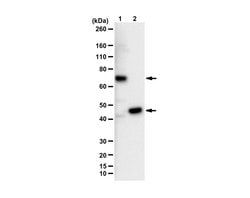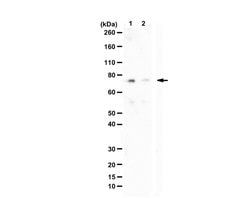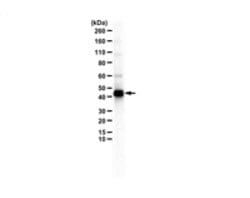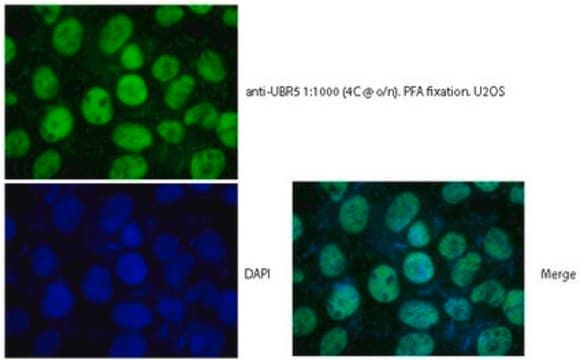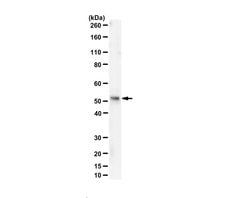KLF4, Rabbit anti-Mouse, Polyclonal, Millipore Sigma™
Manufacturer: Fischer Scientific
Select a Size
| Pack Size | SKU | Availability | Price |
|---|---|---|---|
| Each of 1 | ABE286025UL-Each-of-1 | In Stock | ₹ 17,118.26 |
ABE286025UL - Each of 1
In Stock
Quantity
1
Base Price: ₹ 17,118.26
GST (18%): ₹ 3,081.287
Total Price: ₹ 20,199.547
Antigen
KLF4
Classification
Polyclonal
Dilution
Immunoprecipitation Analysis: A representative lot immunoprecipitated KLF4 in Immunoprecipitation applications (Jiang, J., et. al. (2008). Nat Cell Biol. 10(3):353-60).Chromatin Immunoprecipitation Analysis (ChIP): A representative lot detected KLF4 in Chromatin Immunoprecipitation applications (Edupuganti, R.R., et. al. (2017). Stem Cell Reports. 9(4):1291-1303).Western Blotting Analysis: A representative lot detected KLF4 in Western Blotting applications (Chen, X., et. al. (2008). Cell. 133(6):1106-17).ChIP-seq Analysis: A representative lot detected KLF4 in ChIP-seq applications (Chen, X., et. al. (2008). Cell. 133(6):1106-17).
Gene Alias
Krueppel-like factor 4;Epithelial zinc finger protein EZF;Gut-enriched krueppel-like factor
Host Species
Rabbit
Molecular Weight of Antigen
∽55 kDa observed; 51.88 kDa calculated. Uncharacterized bands may be observed in some lysate(s).
Quantity
25 μL
Research Discipline
Epigenetics & Nuclear Function
Gene ID (Entrez)
NP_034767
Target Species
Mouse
Form
Serum
Applications
ChIP Assay, Immunoprecipitation, Western Blot
Conjugate
Unconjugated
Formulation
Rabbit polyclonal antiserum with 0.05% sodium azide.
Gene Symbols
Klf4;Ezf;Gklf;Zie
Immunogen
GST/His-tagged recombinant fragment corresponding to 320 amino acids from the N-terminal and internal region of murine Klf4.
Purification Method
Unpurified
Regulatory Status
RUO
Primary or Secondary
Primary
Test Specificity
This rabbit polyclonal antibody detects Klf4 in mouse embryonic stem cells.
Content And Storage
Stable for 1 year at -20°C from date of receipt. Handling Recommendations: Upon receipt and prior to removing the cap, centrifuge the vial and gently mix the solution. Aliquot into microcentrifuge tubes and store at -20°C. Avoid repeated freeze/thaw cycles, which may damage IgG and affect product performance.
Isotype
IgG
Description
- Anti-KLF4, Cat
- No
- ABE2860, is a highly specific rabbit polyclonal antibody that targets Krueppel-like factor 4 (Klf4) and has been tested for use in ChIP-seq, Chromatin Immunoprecipitation (ChIP), Immunoprecipitation, and Western Blotting
- Krueppel-like factor 4 (UniProt: Q60793; also known as Epithelial zinc finger protein EZF, Gut-enriched krueppel-like factor, KLF4) is encoded by the Klf4 (also known as Ezf, Gklf, Zie) gene (Gene ID: 16600) in murine species
- Klf4 is a member of the krueppel C2H2-type zinc-finger protein family that regulates multiple biological processes, including proliferation, differentiation, development, and apoptosis
- KLF4 is a developmentally regulated transcription factor that plays an important role in maintaining the pluripotent state in embryonic stem cells (ESCs) and can be used as a marker of the pluripotent state for cells in culture
- It can serve both as activator and as repressor depending upon its environment, but its most prominent function is growth suppression
- Interestingly, increased expression of Klf4 leads to an increase in expression of P21WAF1/CIP1, which is an important checkpoint protein that inhibits cell cycle progression and is essential in mediating the cell cycle arrest at both the G1/S and G2/M boundaries
- Klf4 also mediates the normal functions of the tumor suppressor p53 and contributes to the down-regulation of p53/TP53 transcription
- Mutations in Klf4 gene can lead to unchecked growth and tumor formation
- KLF4 is shown to be often mutated in many colon cancer cell lines and the lack of Klf4 expression is correlated with colorectal cancer pathogenesis
- Elevated expression of Klf4 gene has been linked to gastric cancer, breast cancer, and squamous cell carcinomas
- KLF4 is reported to target the primary miR1-2 loop promoter and stimulates miR-1 expression
- Loss of KLF4 expression is considered as a mechanistic link between aggressive prostate cancer progression and low canonical AR output through miR-1 inactivation
- (Ref.: Jiang, J., et al
- (2008)
- Nat
- Cell Biol
- 10(3); 353-360; Siu, MK et al
- (2016)
- Oncogenesis 5: e282).

